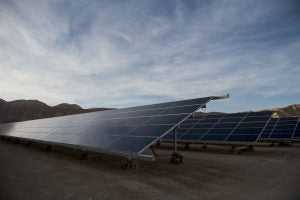
A solar array at the Arava Institute.
Deep in the Israeli desert is an academic institute that is building peace in the region by putting nature at its center. The Arava Institute, in partnership with Ben Gurion University, brings students from Israel, Palestine, Jordan, and around the world to find common ground around environmental problems and build trust – and peace – from there.
On a recent trip to Israel, including to the Arava Institute, I was told many times by many people, “Everything is political here.” Water and energy are no exception. In a region where water can be scarce and oil has long reigned as king, the politics of environmental issues are even more extreme than what people in many parts of the world can wrap their heads around.
Of course, environmental issues in Texas – and across the country – can be highly divisive. But polls consistently show Americans want to protect and defend the health of our children and the well-being of our communities. And clean energy can play a critical role: Our nation’s power sector accounts for nearly 40% of U.S carbon emissions – causing health problems such as asthma attacks, heart attacks, and a staggering number of premature deaths every year.
Today, Texas opens its 85th Legislative Session. Wouldn’t it be refreshing if, instead of fighting over taking action on climate change, leaders sat down with a common starting point: to ensure clean, available water and clean air through renewable energy, while maintaining a robust economy? Perhaps we can learn from the Arava Institute and start with our commonalities, like the desire for clean air and clean water, to build cooperation and achieve clean energy progress.
Building bridges in the Middle East
Water and energy are extremely divisive in the Middle East. In a peace deal struck between Israel and Jordan in 1994, water was at the forefront. Because Israel has, for all intents and purposes, solved its drinking water scarcity (more on that in future blog posts), it is able to share water and technology with its neighbors. Although sharing water as part of the peace deal is not yet smooth sailing, its presence points to the critical nature of the resource in the region.
With its motto, “Nature knows no borders,” the Arava Institute decided to turn the regional politics of environmental issues on its head. Founded as an academic and research center for environmental leadership in 1996, in the wake of the Oslo Middle East Peace Accords, it focuses on renewable energy, sustainable agriculture, transboundary water management, and long-term socio-ecological research. The Institute aims to foster cooperation through solving regional environmental issues, which the students, researchers, and faculty understand transcend political divides.
Although ethnic, religious, and national tensions were still present, the Institute provides a safe space for people to start breaking down those barriers by establishing commonalities and trust. Finding a shared language – nature and the environment – enables students to talk about areas where they may not necessarily agree.
One student I met, Louis Krahan, told me:
Any time there is such a diverse group of people together, controversial, challenging, and substantive conversations are abundant. Further, when that group is working on an issue that intimately affects so many of them [the environment], the dialogue and relationships become so deep and real. […] The Arava Institute allows for the stakeholders from both sides to come together and learn to trust each other, all the while equipping themselves with practical tools to collaborate on an issue important to all.”
Americans agree on clean energy
Sitting at the table listening to the experience of the Institute’s students, I couldn’t help think back to where I live. Texas has serious water issues, like droughts and water scarcity, not to mention clean air issues related to our oil and gas production and use.
And Texas leaders spend a lot of time – and money – arguing back and forth about environmental regulations and the lack thereof. Yet, poll after poll shows people broadly support clean air and clean energy:
- 64 percent of UT Energy Poll respondents say the U.S. should prioritize reducing carbon emissions,
- 74 percent of National Citizen Cabinet survey respondents say reducing air pollution from energy production is a high priority for them,
- 75 percent of Trump voters support taking action to accelerate the development and use of clean energy in the United States, according to a poll by the Republican polling firm Public Opinion Strategies, and
- 85 percent of Texas voters – including 78 percent of Republicans – favor increasing the use of clean energy to generate electricity in Texas, according to a poll by the Texas Clean Energy Coalition.
The stakes may not seem as high in Texas as they are in the Israeli desert, but our children’s future depends on working with each other, not against. If they can find common ground around protecting the air and water in one of the most political places in the world, surely we can do it, too?
Editor’s note: Kate was a guest of Vibe Israel, a non-profit organization leading a tour called Vibe Eco Impact in December 2016, which explores sustainability initiatives in Israel.
Photo source: Shani Sadicario









